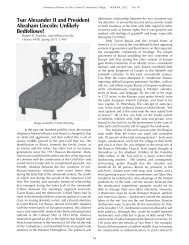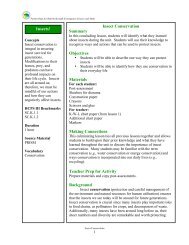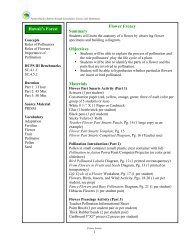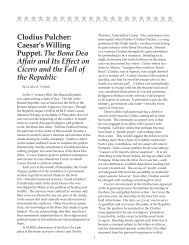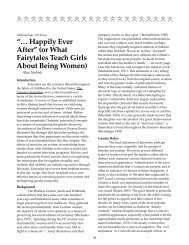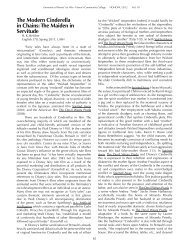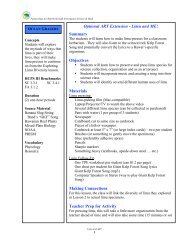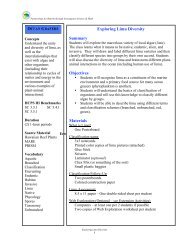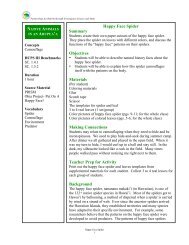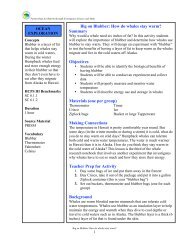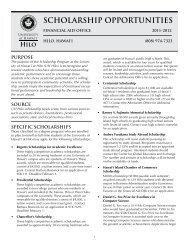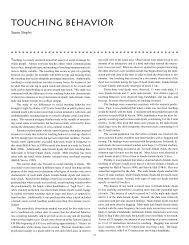A JOURNAL OF ACADEMIC WRITING VOLUME 8
A JOURNAL OF ACADEMIC WRITING VOLUME 8
A JOURNAL OF ACADEMIC WRITING VOLUME 8
You also want an ePaper? Increase the reach of your titles
YUMPU automatically turns print PDFs into web optimized ePapers that Google loves.
from pests and preserves soil fertility better than the typical<br />
CA monoculture system does. 44 Ammann suggests using seed<br />
mixtures containing a variety of genomes that could be applied<br />
just as easily as non-varietal seeds on highly-mechanized farms. 45<br />
Lori Ann Thrupp, in her article “Linking Agricultural<br />
Biodiversity and Food Security: the Valuable Role of<br />
Agrobiodiversity for Sustainable Agriculture,” argues that<br />
preserving biodiversity is essential for protecting food security<br />
and the environment. 46 She believes that “the model and<br />
patterns of industrial agriculture and the Green Revolution<br />
have exacted significant biophysical and socio-economic costs<br />
and disadvantages in many parts of the world, in both North<br />
and South.” 47 She says CA monoculture makes crops more<br />
susceptible to pests and disease, and reminds her readers<br />
that many insects and fungi that chemicals kill are actually<br />
beneficial to plants. 48 She believes that moving to and all-OA<br />
system is not realistic, but incorporating organic techniques<br />
into CA could improve environmental health and make world<br />
agriculture a sustainable practice. 49<br />
The debate over how to increase and maintain world food<br />
supply is one of the most important issues of our time. Green<br />
Revolution farming has proved to offer the high yields necessary<br />
for feeding billions, but its practices undoubtedly contribute to<br />
climate change and ecological degradation. Organic agriculture,<br />
when practiced responsibly, can help alleviate environmental<br />
stresses and contribute to the healing of the earth. However,<br />
can it realistically feed the 10 billion people who are expected<br />
to live on this earth by 2050? While some people believe it can,<br />
others are adamant that it can not, and some people suggest the<br />
solution is a synthesized system. Regardless of whether there is<br />
one correct answer or several, the issue is very real and present.<br />
It must be considered objectively and consistently researched<br />
so that the world can come to a solution that successfully<br />
perpetuates the human race and preserves the earth for future<br />
generations.<br />
44 Ibid, 382.<br />
45 Ibid, 382.<br />
46 Thrupp, “Linking Agricultural Biodiversity,” 265.<br />
47 Thrupp, “Linking Agricultural Biodiversity,” 269.<br />
48 Ibid, 272<br />
49 Ibid.<br />
38 - HOHONU Volume 8 2010<br />
Bibliography<br />
Ammann, Klaus. “Why Farming With High Tech Methods<br />
Should Integrate Elements of Organic Agriculture.” New<br />
Biotechnology 25, no. 6 (2009): 378-388.<br />
www.sciencedirect.com.<br />
Badgley, Catherine and others. “Organic agriculture and the<br />
global food supply.”Renewable Agriculture and Food Systems<br />
22, no. 2 (2006): 86-108.<br />
Bailey, Ronald, ed. The True State of the Planet: Ten of the World’s<br />
Premier Environemental Researchers in a Major Challenge<br />
to the Environmental Movemement. New York: The Free<br />
Press, 1995.<br />
Borlaug, Norman E. “Feeding a World of 10 Billion People:<br />
The Miracle Ahead.” In Vitro Cellular and Developmental<br />
Biology, Plant 38, no. 2 (2002): 221-228. www.jstor.org.<br />
Connor, D.J. “Organic Agriculture Cannot Feed the World.”<br />
Field Crops Research 106, no. 2 (2008): 187-190. www.<br />
sciencedirect.com.<br />
Halweil, Brian. “Can organic farming feed us all?” World Watch<br />
19, no. 3 (May 2006):18-24. www.ebscohost.com.<br />
Hamer, Ed and Mark Anslow. “10 reasons why organic farming<br />
can feed the world.” The Ecologist, March 1, 2008. http://<br />
www.theecologist.org/trial_investigations/268287/10_<br />
reasons_why_organic_can_feed_the_world.html<br />
McKibben, Bill. “The Cuba Diet.” Harper’s Magazine 310, no.<br />
1859 (April 2005): 61-69. www.ebscohost.com.<br />
Miller, John J. “The Organic Myth.” National Review 56, no. 2<br />
(2006): 35-37. www.lexisnexis.com.<br />
Ronald, Pamela C., and Raoul W. Adamchak. Tomorrow’s Table:<br />
Organic Farming, Genetics, and the Future of Food. New<br />
York: Oxford University Press, 2008.<br />
Thrupp, Lori Ann. “Linking Agricultural Biodiversity and Food<br />
Security: The Valuable Role of Sustainable Agriculture.”<br />
International Affairs 76, no. 2 (2000): 265-281.www.jstor.<br />
org.



